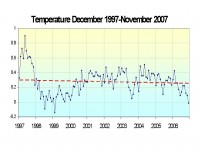By Kenneth P. Green, Joel M. Schwartz, Steven F. Hayward
The Intergovernmental Panel on Climate Change’s (IPCC) new Summary for Policymakers (SPM) of its Synthesis Report (SR) should be taken with several chunks of salt. The summary itself is a political document that downplays assessments of uncertainty from the scientific reports written by the main body of the IPCC, which themselves are far more subjective than the IPCC would have one believe. Equally important, both the IPCC’s summaries and main reports omit much contrary evidence. In several cases, the SR disagrees with the reports on which it is based, and it fails to take account of cautionary publications in the scientific literature that were available early enough to have been incorporated into the SR. Climate change and climate policy are key issues for future human welfare, but that concern should translate into sober analysis and actions that are likely to do more good than harm. The people of the world should not let themselves be steamrolled by a report that reflects the IPCC’s interest in promoting climate change fears, rather than in conveying the weight of the scientific evidence.
In other words, the SPMs contain what the IPCC’s political leadership wishes to emphasize about climate change, and this political leadership has never been shy about affirming that its ostensibly dispassionate scientific reviews are intended to serve the political goal of stimulating the world’s governments to impose deep cuts in greenhouse gas emissions. Commenting on the then-upcoming release of the WG I SPM, IPCC chairman Rajendra Pachauri said, “I hope that [the IPCC’s Fourth Assessment] will shock the governments so much that they take action."According to Der Spiegel, “When Renate Christ, the secretary of the IPCC, is asked about her opinion of reporting on climate change, she refers to articles that mention ‘climate catastrophe’ and calls them ‘rather refreshing.’” Read the full report here.
PRNewswire-USNewswire/—For the second time this week, the International Climate Science Coalition (ICSC) was kicked off the press schedule for the United Nations’ climate conference in Bali, Indonesia. The ICSC is a group of scientists from Africa, Australia, Europe, India, New Zealand, and the U.S. who contend sound science does not support the outrageous claims and draconian regulations proposed in Bali.
The ICSC team leader, Bryan Leyland, an expert in carbon and energy trading, reported, “This morning I confirmed we had the main conference hall for 9:00 AM tomorrow. At 4:30 PM today, I found that Barbara Black bumped us off the schedule and closed further bookings. I’m fuming.” Black is NGO liaison officer for the UN Framework Convention on Climate Change in Bali.
Earlier in the week, UN officials in Bali closed down the ICSC’s first press conference there. Black interrupted the press conference and demanded the scientists immediately cease. She threatened to have the police physically remove them from the premises. Black’s efforts are part of the United Nations’ ongoing censorship of dissenting voices at Bali. ICSC scientists have been prevented from participating in panel discussions, side events, and exhibits.
Former Vice President Al Gore said Thursday the United States is “principally responsible” for blocking progress at the U.N. climate conference in Bali. Gore urged delegates at the conference to take urgent action to reduce emissions of greenhouse gases blamed for global warming. “My own country, the United States, is principally responsible for obstructing progress here in Bali,” said Gore, who won this year’s Nobel Peace Prize for helping alert the world to the danger of climate change. The United States has opposed including in a final conference document a suggestion that industrialized countries reduce emissions by between 25 percent and 40 percent by 2020.

Earlier Thursday, European nations threatened to boycott U.S.-led climate talks next month unless Washington accepts a range of numbers for negotiating deep reductions of global-warming emissions. See more here. See US response here.
By Eugenio Hackbart, METSUL Weather Center, Brazil
Should we have any doubt that global warming hysteria has reached an all-time high ? “If the worst projections regarding climate change in Northern Europe prove to be correct, Santa Claus will dress in Bermuda shorts and is going to travel with a sleigh pulled by camels instead of reindeersâ€. This is the initial sentence of a report (link below) published today in the popular news site of Latin America Terra, based on a newswire by agency AFP, concerning global warming. Later, the report states that the worst forecast point to a warming of 8C until the year 2080 and that the average temperature in the area of Rovaniemi – the supposed home address of Santa Claus - would top to 8C below zero in the end of the century (not exactly shorts and camel weather)

People are being bombarded everyday by freaky reports. This is no longer a scientific issue. Global warming definitely became a circus. Report in Portuguese is here.
By Tom Nelson
Carrying banners with slogans like “cut carbon not forests” and “actions speak louder than words” protesters in London marched in torrential rain and biting cold past parliament and through Trafalgar Square to rally in front of the U.S. embassy. Update: Check this out--Reuters has now removed ”and biting cold” from the above sentence: Carrying banners with slogans like “cut carbon not forests” and “actions speak louder than words” protesters in London marched in torrential rain past parliament and through Trafalgar Square to rally in front of the U.S. embassy.
Note also the paragraph about disappointing attendance: British police said 2,000 people took part in the march. Organisers said they estimated the number at 7,000. Note that organizers had hoped for a vastly greater turnout: Organisers say they hope up to 40,000 people could attend the rally. “Last year we attracted 35,000 people and we hope this will be bigger,” said Phil Thornhill of the Campaign Against Climate Change, which is organising the event.
By Brandon Larrabee, Savannah Morning News
Georgia lawmakers set up a meeting, which included members of the Senate Natural Resources and Environment Committee and the Regulated Industries and Utilities Committee, to hear testimony on whether cars, power plants and other human activities contribute to climate change by belching out greenhouse gases like carbon dioxide.
Sen. Mitch Seabaugh, R-Sharpsburg, questioned the scientific consensus that the Earth is warming. He pointed out that most scientists in Christopher Columbus’ day believed the Earth was flat and that a squadron of fighter planes lost over Greenland in 1942 was found in the 1990s under 250 feet of ice, even as the world was reportedly getting warmer. Seabaugh said he believed the theory of man-made climate change was being pushed by industries that could benefit financially.
In a separate presentation, self-proclaimed global warming skeptic Harold Brown, an agricultural scientist and professor emeritus at the University of Georgia, said many were worried about “global cooling” as recently as the 1970s. He also said some of the direst effects of a warming world, such as an increase in the number of deaths because of heat-related illnesses, might not be as bad as some feared, even if climate change were to continue.
“Global warming is a wonderful environmental disease,” he said sarcastically. “It has a thousand symptoms and a thousand cures and it has tens of thousands of practitioners with job security for decades to come unless the press and public opinion get tired of it.” Read more here.
By Bruno De Wolf as comment in the Reference Frame
I took the RSS data and executed a simple linear regression in Excel over the last 10 years, from December 1997 to November 2007 (with tools --> data analysis --> regression). Temperatures are indicated in difference between the current month and the long term average. For instance: a temperature of +0.2°C means that month was 0.2°C warmer than the long term average.

What do we see? The linear trend is going down with a rate of 0.05°C per decade. What’s more, the last 8 months are situated below the trendline, so the negative trend is likely not going away in the next couple of months. Read more here.
Icecap Note: This satellite data used is for the region from 70S to 82.5N, where most all of civilization resides. Kyoto was at the start of the ten year period and Bali the end. During this period the alarmists are telling us the warming is reaching catastrophic proportions, the populated world has actually cooled slightly and the cooling is accelerating.
By Seth Borenstein, AP
For the first time, more than 200 of the world’s leading climate scientists, losing their patience, urged government leaders to take radical action to slow global warming because “there is no time to lose.” A petition from at least 215 climate scientists calls for the world to cut in half greenhouse gas emissions by 2050. It is directed at a conference of diplomats meeting in Bali, Indonesia, to negotiate the next global warming treaty. The petition, obtained by The Associated Press, is to be announced at a press conference there Wednesday night.
The appeal from scientists follows a petition last week from more than 150 global business leaders also demanding the 50 percent cut in greenhouse gases. That is the estimate that scientists calculate would hold future global warming to a little more than a 3-degree Fahrenheit increase and is in line with what the European Union has adopted. In the past, many of these scientists have avoided calls for action, leaving that to environmental advocacy groups.
The unprecedented petition includes scientists from more than 25 countries and shows that “the climate science community is essentially fed up,” said signer Andrew Weaver of the University of Victoria in Canada. (Icecap note: one of the many modeler scientists who has benefited greatly from the global warming hype).
But Jerry Taylor, a senior fellow at the libertarian Cato Institute said “scientists are in no position to intelligently guide public policy on climate change.” Scientists can lay out scenarios, but it is up to economists to weigh the costs and benefits and many of them say the costs of cutting emissions are higher than the benefits, he said. Read more here.


